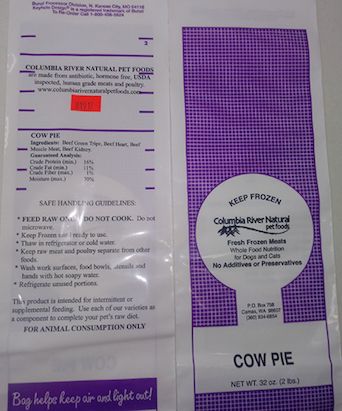RECALL: Raw Food Recall Expanded Due to Listeriosis Risk
Columbia River Natural Pet Foods has expanded its recall of fresh-frozen Cow Pie products due to potential contamination with Salmonella and Listeria monocytogenes.
UPDATE (January 2, 2019)—Columbia River Natural Pet Foods has expanded its initial early December recall to now include more products from its line of raw pet foods due to their potential to be contaminated with Salmonella and Listeria monocytogenes. The recall now includes 261 packages of Cow Pie lot number 72618 and 82 packages of Chicken & Vegetables lot number 111518 fresh-frozen meats for dogs and cats, produced in July 2018 and November 2018. The voluntary recall was expanded after the Washington State Department of Agriculture found the pathogens in at least 1 package of each product.
As with the products included in the earlier recall, the affected pet food items were distributed in Alaska, Oregon, and Washington through retail stores and direct delivery. The Cow Pie product comes in 2-lb purple and white plastic bags with lot number 72618 found on an orange sticker. The Chicken & Vegetables product comes in 2-lb turquoise and white plastic bags with lot number 111518 found on an orange sticker.
No illnesses linked to cats and dogs being fed either product have been reported to date.

Vancouver, Washington—based Columbia River Natural Pet Foods is voluntarily recalling 933 packages of Cow Pie fresh frozen meats for dogs and cats because of the potential for Listeria monocytogenes contamination.
Cow Pie fresh-frozen meat products are intended to be fed raw to dogs and cats. The affected product, produced in August 2017, was distributed in Alaska, Oregon, and Washington through retail stores and direct delivery. Affected packages are 2-lb purple and white plastic bags with lot number 81917 found on an orange sticker.
The potential for contamination was noted after routine testing by the Washington State Department of Agriculture revealed the presence of Listeria monocytogenes in 1 package. No illnesses have been reported to date.
Listeriosis in pets is rare but can occur. Humans who handle contaminated pet products are also at risk, especially if they have not washed their hands after coming into contact with the product or with any surfaces exposed to the product. In fact, listeriosis is one of the leading causes of human death from foodborne illness. An estimated 1600 people get the infection each year, and about 260 die. Pregnant women and their newborns, adults 65 or older, and immunocompromised individuals are at highest risk.
The primary signs and symptoms of infection in both pets and people include nausea, vomiting, aches, fever, and diarrhea. Infection that spreads through the bloodstream to the nervous system can lead to meningitis and other potentially fatal problems. Consumers exhibiting these signs after having contact with this product should contact their healthcare providers; pets that have consumed the recalled product and are exhibiting these signs should be taken to their veterinarian.
Consumers who have purchased this product should discontinue use and return the unused portion to the place of purchase for a full refund. Consumers with questions may contact the company at 360-834-6854.